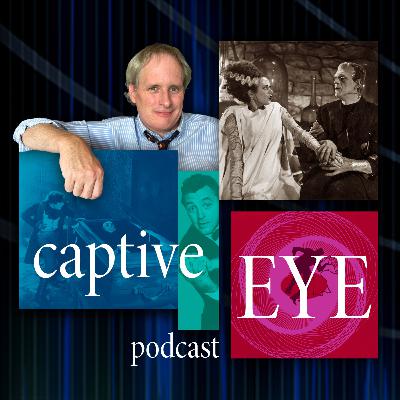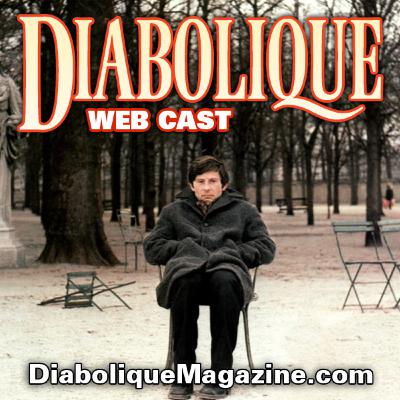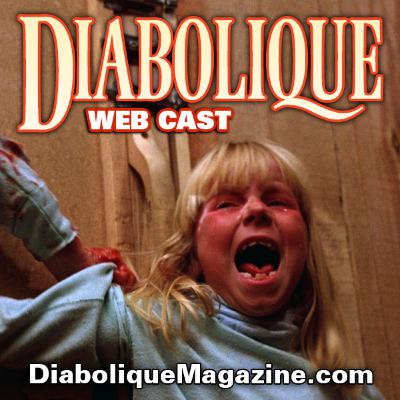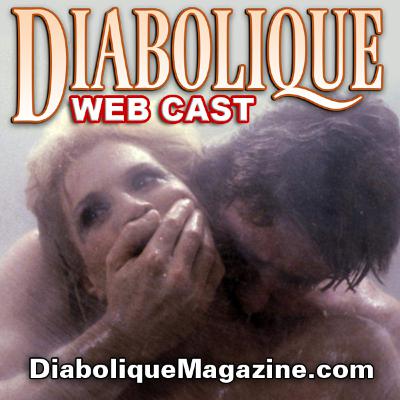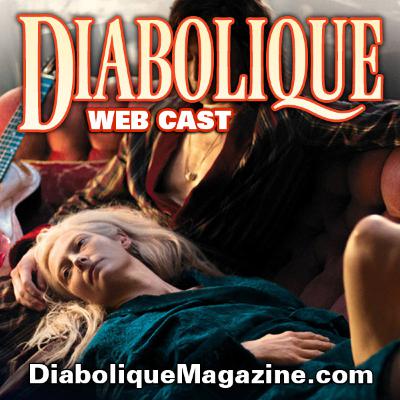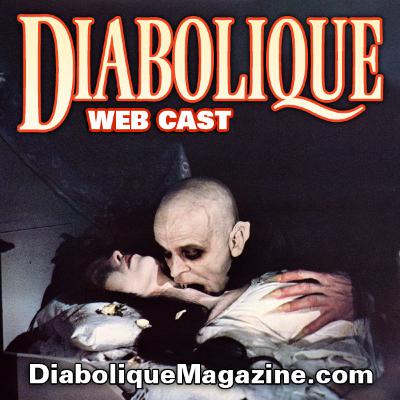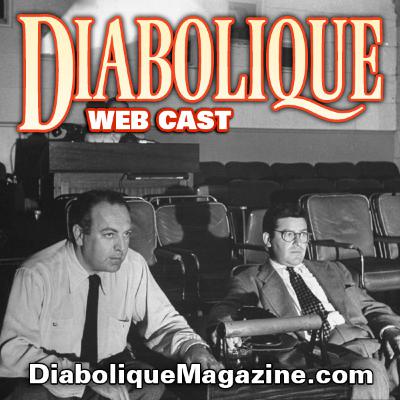Discover Captive Eye
Captive Eye

Captive Eye
Author: Steve Head
Subscribed: 2Played: 48Subscribe
Share
© Steve Head
Description
In conjunction with it's popular print magazine, Diabolique offers authoritative and in-depth coverage of int'l horror, sci-fi, and fantasy cinema, past and present. Each podcast is presented in a compelling style that both stimulates and entertains. Each podcast features special guests, established film scholars, writers, and journalists. The show is produced by people who love the Horror Movie Genre and are dedicated to bringing it to the world. New episodes added regularly, so get some popcorn... relax and enjoy the show!
42 Episodes
Reverse
On episode 46 of Captive Eye, David Kleiler, Jean-Paul Ouellette and Steve Head consider the enduring qualities of James Whale’s Bride of Frankenstein (1935), and bring to light some rarely talked about stories from its making and original release.
Hiroshi Teshigahara’s 1964 film Woman in the Dunes, adapted from the novel by Kobo Abe, is fascinating and disturbing.
The film’s protagonist is a man trapped by villagers, in a dilapidated house at the bottom of a sand pit; the sole occupant of which is a woman. He soon realizes that there is no escape from the pit for either of them. As time passes, the couple must contend with the futility of their situation, and the ever encroaching sand. And, as the man becomes settled in his new-found purgatory, he realizes that escaping the pit may not be the way to freedom.
On this episode of Captive Eye, David Kleiler, J. P. Ouillette and I consider the varied nuances of Woman in the Dunes, which was recently released on Blu-ray by the Criterion Collection.
When Martin Scorsese brought Michael Powell’s Peeping Tom back from its longtime purgatory, the word on the street was that it was a piece of transgressive cinema from an acclaimed director, *before* Psycho, which caught a lot of hell it didn’t deserve, and largely ended its creator’s career.
What lingers about Peeping Tom is its sense of tragedy: its betrayal of trust. The magnificently dramatic collision of Anna Massey’s devoted and naive Helen, and Karlheinz Bohm’s Mark, an introverted, outsider (literally, he’s from another country) with a psychotic urge instilled in him by his father.
Peeping Tom wasn’t created with broad appeal in mind. When you get right down to it, Peeping Tom is essentially a rebellious statement made at a turning point in Powell’s career. It’s an obliteration of expectations; and career-wise a costly one.
On this episode of Captive Eye (formerly Diabolique Webcast), writer/producer/director J. P. Ouillette and Prof. David Kleiler join me to discuss director Michael Powell’s intriguingly meticulous 1960 classic.
Someday someone will make the definitive documentary about the making of The Terminator (1984). Until then we’ll have the periodic cast and crew interviews. Until then we’ll have their stories.
On this special episode of the Diabolique Webcast, Jean-Paul Ouellette, the second unit action director on The Terminator, adds some never-before-shared behind-the-scenes stories from the making of the film. The episode consists of two parts. In the first part, I discusses the film with David Kleiler and J-P Ouellette. In the second part, J-P and I hold an in-depth discussion on the making of the film.
Earlier this year, when Shout Factory announced their Blu-ray release of John Carpenter’s Village of the Damned, I can’t say I was enthusiastic about the news. It mostly served to remind me how much I wanted to like the film and that I found it hugely disappointing. Sure, it’s neatly stylish, and even cool at times. But it’s a colorfully lackluster endeavor that sure doesn’t stand up to director Wolf Rilla’s black-and-white original—a film more worthy of appreciation.
On this episode of the Diabolique Webcast, J. P. Ouellette, David Kleiler, and I discuss the 1960 original Village of the Damned, which needs the well-produced-Blu-ray-release treatment afforded its remake.
The Tenant isn’t the first film I think of when the name Roman Polanski is mentioned. The director’s 1976 film strikes me more as a curiosity. Does its central character, Trelkovsky, out of all the characters in Polanski’s films, most represent the the real Roman Polanski? Parallels are easily drawn; it seems certainly a strong case of a filmmaker’s identification with a character. And that’s The Tenant’s attraction. We could well be watching a surreal impression of Polanski’s timorous life.
On this episode of the Diabolique Webcast, J. P. Ouillette joins David Kleiler and me to discuss The Tenant (which will hopefully someday be released on Blu-ray; until then, there’s Paramount’s 2002 DVD release).
Mulholland Drive is perhaps a unique sort of puzzle—one that’s different upon every deconstruction. Conversationally you can take the film apart and put it back together and maybe you’ll come up with an entirely different theory as to what’s truly going on in director David Lynch’s 2001 psychodrama.
On this episode of the Diabolique Webcast, writer/producer/director J. P. Ouillette and Prof. David Kleiler join me to discuss Mulholland Drive, which was recently released on Blu-ray by The Criterion Collection. Speaking for myself, if I recorded this podcast again I might arrive at completely different conclusions about the film. So go ahead and press play for my current take.
The Brood entertains the notion that psychotherapy can be dangerous. It doesn’t merely result in a changing of one’s mind, it can also result in a changing of one’s body—disturbingly so. And woe be the therapist who messes around with this power. This playing on a fear of psychology is the territory of David Cronenberg.
On this episode of the Diabolique Webcast, writer/producer/director J. P. Ouillette joins David Kleiler and me to discuss The Brood, which will soon be released on Blu-ray by the Criterion Collection.
From a technical strand-point, Brian de Palma’s 1980 psychological thriller Dressed to Kill is top notch. His fascination with the techniques of filmmaking makes the film a treasure trove for cinephiles. The film has its detractors, of course, but fans of split-diopter and tracking shots can’t deny that Dressed to Kill has beautiful examples of both. And I’ll admit, I can be charmed by a film’s style enough to forgive deviations from its narrative. Mr. de Palma believes you can too.
On this episode of the Diabolique Webcast, David Kleiler and I consider the merits of Dressed to Kill, which will be released on Blu-ray by the Criterion Collection in September.
Much has been written about Quentin Tarantino’s influences – the Spaghetti Westerns of Leone and Corbucci; the French New wave, particularly Goddard’s Band of Outsiders and Breathless; and, more significantly McBride’s 1983 remake of Breathless. And let’s not forget the Italian horrors of Mario Bava and Dario Argento; Fukusaku’s Battle Royale; and American Slasher films. With Death Proof, Tarantino creates a fascinating combination of these influences within the framework of a Slasher film.
In this episode, David Kleiler and I take on the unique genre mash-up that is Death Proof, Tarantino’s tip-of-the-hat to Grindhouse cinema.
Steve Head and David Kleiler discuss Nicolas Roeg’s Don’t Look Now (1973), a haunting supernatural thriller, starring Donald Sutherland and Julie Christie. The film is renowned for its innovative editing and striking cinematography, as well as for its naturalistic eroticism. It is being released on blu-ray by the Criterion Collection, in an impressive new 4k restoration.
Peter Keough joins David and Steve for a round-table discussion on Orson Welles, one of cinema’s original independent filmmakers. Two of the films they focus on are Othello (1952) and F for Fake (1973), both of which have recently been released on blu-ray for the first time.
Othello is available on BD in France, from Carlotta Films; while F for Fake has just been released on BD by Criterion in the USA.
What would you do if you and your significant other stopped at a gas station while traveling, and your significant other suddenly vanished without trace? That is the premise for George Sluizer’s haunting and very disturbing 1988 film, The Vanishing, which has just been released on Blu-ray by The Criterion Collection. David Klieler and Steve Head discuss the film in depth.
On this episode of the Diabolique Webcast, David Klieler and Steve Head consider the career of director David Cronenberg; with particular emphasis on his 1981 film Scanners, which has recently been released on Blu-ray by The Criterion Collection.
Join Steve Head and David Kleiler for a discussion on Jim Jarmusch’s ultra-cool vampire film, Only Lovers Left Alive, starring Tilda Swinton and Tom Hiddleston. The film is available on blu-ray, August 19 2014, from Sony Pictures Home Entertainment.
On the eve of beginning production on his new film, Blood Mania, the Godfather of Gore Herschell Gordon Lewis talks with us about his career, the state of the film industry and his relationship with his audience. Known for his films Blood Feast, Gore Gore Girls and The Wizard of Gore, Lewis redefined contemporary horror films with humour and guts.
Joined by James Saito, producer of Blood Mania, they talk about, Diabolique Films, the new production company that’s producing Blood Mania, and reveal some tidbits about future projects.
Thirty-five years after it’s initial release, Nosferatu the Vampyre, Werner Herzog’s haunting tone poem of death and loneliness is as potent today as it was in 1979. To celebrate the film’s recent arrival on blu-ray for the first time in both the US and the UK, Fangoria Magazine #334 has featured it on its cover. Steve Head and David Kleiler discuss the film with special guest, Fangoria’s editor, Chris Alexander who counts Nosferatu among his favorite films of all time. The film is available on blu-ray from the BFI in the UK, and from Shout! Factory in the US.
He believed in peace in darkness, friendship in solitude, and for some of his characters, freedom in death; even admitting to an RKO executive that the message of The Seventh Victim (1943) was, in fact, “Death is good.” His films abound in sly and clever details (qualities diminished by home video). Val Lewton (1904 – 1951) was a master of dark subtleties.
On this special episode, inspired by the upcoming Val Lewton retrospective at the Harvard Film Archive, film professor, and ex-artistic director of The Coolidge Corner Theater, David Kleiler, and Ambrose Roche, producer of Pontypool, who sites Lewton as a key influence on his work, join me to discuss Lewton’s RKO productions, from 1942’s Cat People to 1946’s Bedlam, and his enduring legacy.
Giving credit where it’s due, cinephiles must thank Liz Coffey, an archivist at the Harvard Film Archive, for saving the only known-to-exist 35mm print of the “middle version” of The Wicker Man. Its discovery—following an inquiry by a representative of Studio Canal, who later confirmed the print’s edit with director Robin Hardy—was one of the great finds at the HFA in 2013. On this episode of the Diabolique Webcast, Liz tells the untold story about how the print arrived at the HFA (one possibly being via Roger Corman), how it was nearly thrown away, and how it was saved.
On this episode of the Diabolique Webcast, film professor David Kleiler and film critic Brett Michel join Steve to discuss Akira Kurosawa’s 1957 rethinking of Shakespeare’s Macbeth; Throne of Blood, which has recently been released on Blu-ray from The Criterion Collection.


